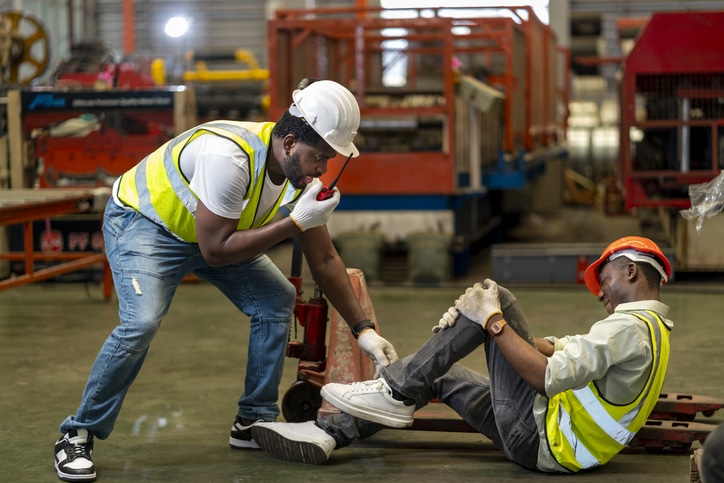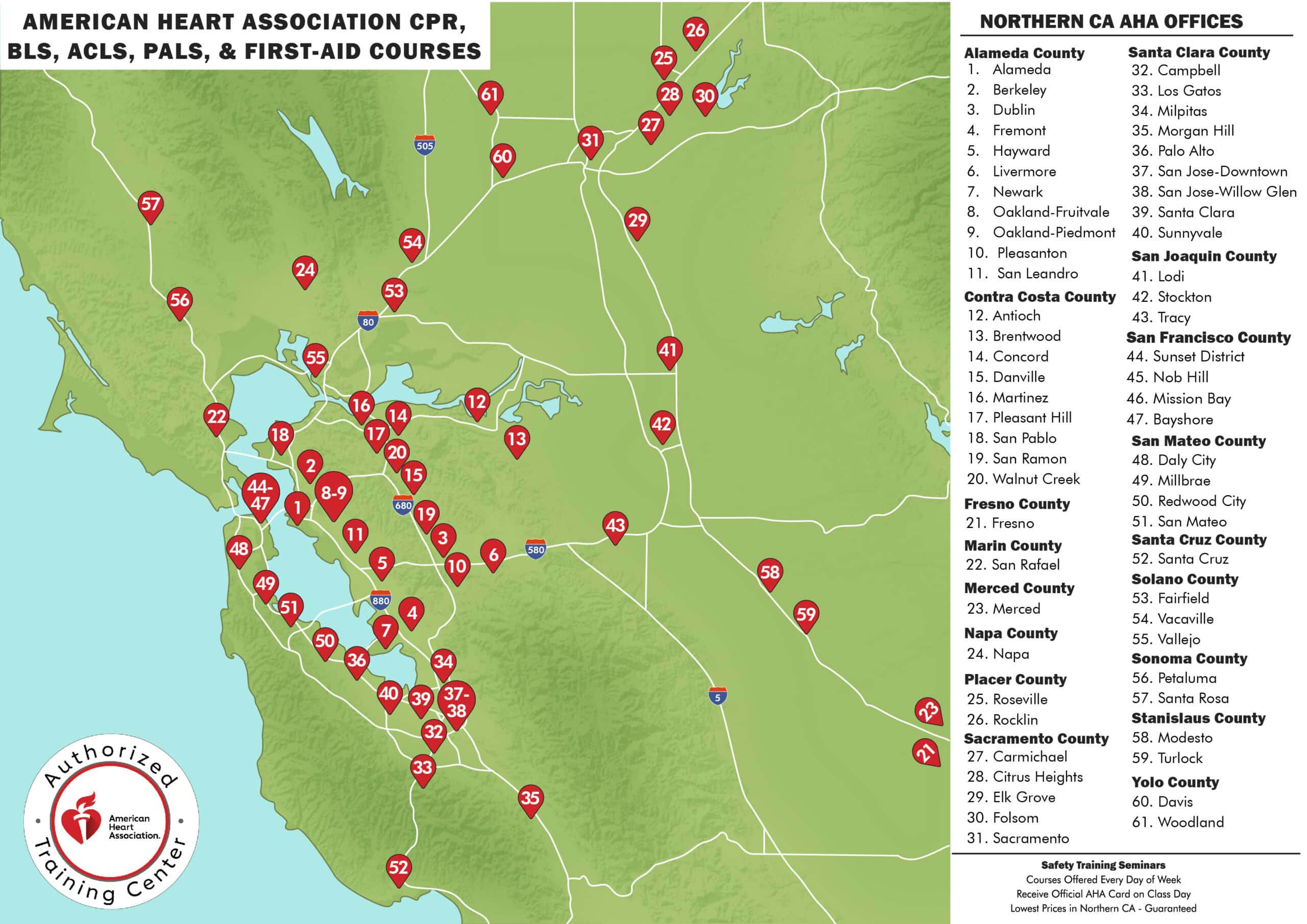American Heart Association© CPR & First-aid Classes in Visalia

CPR, AED, And First-aid
Course Name: CPR, AED, and First-aid
Online Course Length: About 2 hours (In your home)
Skills Testing: 30-50 minutes at one of our CPR testing sites
Description: CPR (all ages), AED, bleeding, burns, seizures, epi-pen, etc.
Price: $89 (For Safety Training Seminars certification card)
Upgrade to AHA Pediatric (EMSA approved for child care): Extra $40
Upgrade to American Heart Association certification: Extra $40
When: CPR & First-aid classes are offered Monday – Sunday throughout the day.
Where: Courses are offered in over 60 cities across Northern California.
Card Issuance: You will receive the certification card on the day of class.
Low Price Guarantee: If you find a lower price, we will match the price.
View Upcoming CPR & First Aid Courses in Visalia
CPR & First-aid Courses Near Me In Visalia

- 5215 W Noble Street, Suite 102, Visalia, CA 93277
- (559) 218-5860
Saving Lives: The Role of CPR & First-Aid Certification Classes in Visalia
Visalia, a bustling city in California’s Central Valley, is renowned not just for its agricultural contributions but also for its commitment to community health and safety. Among the many programs that contribute to the well-being of its residents, Cardiopulmonary Resuscitation (CPR) and First-Aid certification classes stand out as essential components. These classes equip individuals with the skills and confidence to respond to emergencies, potentially saving lives. This article explores the importance of CPR and First-Aid certification classes in Visalia, emphasizing how these courses empower individuals to act decisively during emergencies and enhance the overall safety of the community.
The Importance of CPR and First-Aid Training
CPR and First-Aid training are critical skills that can mean the difference between life and death in emergency situations. According to the American Heart Association (AHA), over 350,000 cardiac arrests occur outside of hospitals each year in the United States. Immediate CPR can double or even triple a victim’s chance of survival. Similarly, knowledge of First-Aid can be crucial in treating injuries, managing medical emergencies, and preventing complications until professional help arrives.
CPR involves a combination of chest compressions and rescue breathing, aimed at maintaining circulation and breathing in a person who has suffered cardiac arrest. First-Aid covers a wide range of emergency care, including wound management, choking relief, handling burns, and responding to allergic reactions. By learning these skills, individuals become equipped to provide immediate assistance, which is especially important in rural or underserved areas where emergency medical services may take longer to arrive.
CPR & First-Aid Certification Classes in Visalia
Visalia is home to a variety of organizations that offer CPR and First-Aid certification classes, including hospitals, community centers, and specialized training institutes. These classes are designed for a broad audience, including healthcare professionals, teachers, childcare providers, employees in high-risk industries, and members of the general public who want to be prepared to handle emergencies.
The certification classes in Visalia adhere to guidelines set by reputable organizations such as the American Heart Association (AHA), the American Red Cross, and the National Safety Council (NSC). These organizations provide standardized training that ensures participants receive up-to-date and evidence-based instruction. Classes are typically led by certified instructors who bring their expertise and experience to the training sessions, making the learning process both informative and engaging.
Course Components and Structure
CPR and First-Aid certification classes in Visalia cover a comprehensive curriculum designed to prepare participants for a wide range of emergency situations. The courses are structured to combine theoretical knowledge with practical skills training, ensuring that participants can apply what they learn effectively in real-life scenarios. Key components of the training include:
Basic Life Support (BLS) and CPR: Participants learn the fundamentals of Basic Life Support, including how to recognize cardiac arrest, provide high-quality chest compressions, and perform rescue breathing. The training covers both adult and pediatric CPR, as the techniques vary slightly depending on the age and size of the victim. Participants also learn how to use an Automated External Defibrillator (AED), a device that can restore a normal heart rhythm during sudden cardiac arrest.
Choking Relief: One of the critical skills taught in CPR classes is how to relieve choking. Participants learn the Heimlich maneuver and other techniques to clear airway obstructions in both adults and children. This training is essential, as choking can lead to severe complications or death if not addressed immediately.
First-Aid Techniques: First-Aid training covers a wide array of emergency situations. Participants learn how to assess the scene for safety, evaluate a victim’s condition, and provide appropriate care. This includes managing bleeding, treating burns, stabilizing fractures, administering epinephrine for severe allergic reactions, and performing other vital interventions.
Use of First-Aid Kits: Participants are trained on the contents of a standard First-Aid kit and how to use the items effectively. This includes using bandages, antiseptics, splints, and other tools to provide immediate care for various injuries.
Responding to Medical Emergencies: The training also addresses how to respond to medical emergencies such as heart attacks, strokes, seizures, diabetic emergencies, and shock. Participants learn to recognize the signs and symptoms of these conditions and provide appropriate care until professional help arrives.
Legal and Ethical Considerations: CPR and First-Aid classes also cover the legal and ethical aspects of providing emergency care, including the Good Samaritan laws, which protect individuals who assist others in emergencies from liability. This knowledge helps participants feel confident and empowered to act when needed.
Most CPR and First-Aid certification classes in Visalia use a blended learning approach, combining online modules with in-person training sessions. The online portion allows participants to learn at their own pace, covering the theoretical aspects of CPR and First-Aid. The in-person sessions are focused on hands-on practice, where participants can demonstrate their skills under the guidance of certified instructors. This approach ensures that participants are well-prepared to handle real-life emergencies confidently.
Hands-On Simulation Training
A critical aspect of CPR and First-Aid certification classes is hands-on simulation training. In Visalia, these classes use realistic mannequins, AED trainers, and other simulation tools to provide an immersive learning experience. Participants practice chest compressions, rescue breathing, and the use of AEDs on mannequins that simulate a human body’s response to CPR. They also engage in role-playing scenarios that mimic common emergency situations, such as responding to a choking victim or treating a severe cut.
Simulation training helps participants build muscle memory, develop quick decision-making skills, and gain confidence in their ability to provide emergency care. By practicing in a controlled environment, participants can receive immediate feedback from instructors, allowing them to refine their techniques and improve their effectiveness.
Impact on Community Health
The widespread availability of CPR and First-Aid certification classes in Visalia has a significant impact on community health and safety. By empowering residents with the skills to respond to emergencies, these classes help create a safer and more prepared community. In emergencies, time is of the essence, and immediate intervention by a bystander can be crucial. Having a community with a high number of CPR and First-Aid trained individuals increases the likelihood that a person in distress will receive timely help.
Moreover, CPR and First-Aid training promote a culture of awareness and preparedness. Individuals who have undergone this training are more likely to recognize the signs of a medical emergency and take appropriate action. This proactive approach not only saves lives but also enhances the overall sense of security and well-being in the community.
Conclusion
CPR and First-Aid certification classes in Visalia play a vital role in equipping residents with the knowledge and skills needed to respond to emergencies effectively. These classes are more than just educational programs; they are life-saving initiatives that empower individuals to take action when it matters most. As Visalia continues to grow, the importance of CPR and First-Aid training will only increase, ensuring that the community remains prepared to face emergencies with confidence and competence. By fostering a culture of safety and readiness, Visalia sets an example of how a community can come together to protect its members and enhance public health.
FAQ
Who should attend CPR & First-Aid certification classes in Visalia?
CPR & First-Aid certification classes are suitable for anyone who wants to learn life-saving skills, including parents, teachers, caregivers, healthcare professionals, and members of the general public.
How long does a CPR & First-Aid certification course typically last?
CPR & First-Aid certification courses usually span over one to two days, depending on the training provider. The course includes a combination of classroom instruction, skills practice, and hands-on demonstrations.
Is there a renewal requirement for CPR & First-Aid certification?
Yes, CPR & First-Aid certifications are typically valid for two years, after which individuals are required to undergo renewal courses to maintain their certification. Renewal courses often include updates on guidelines and practice of skills.
